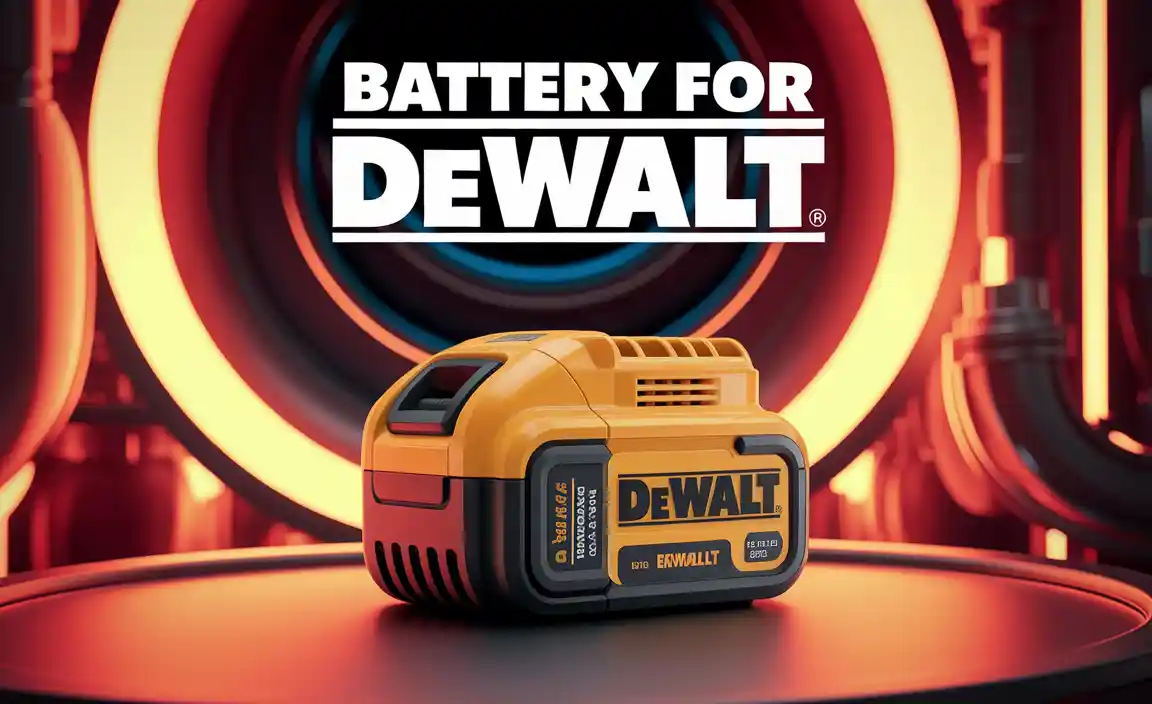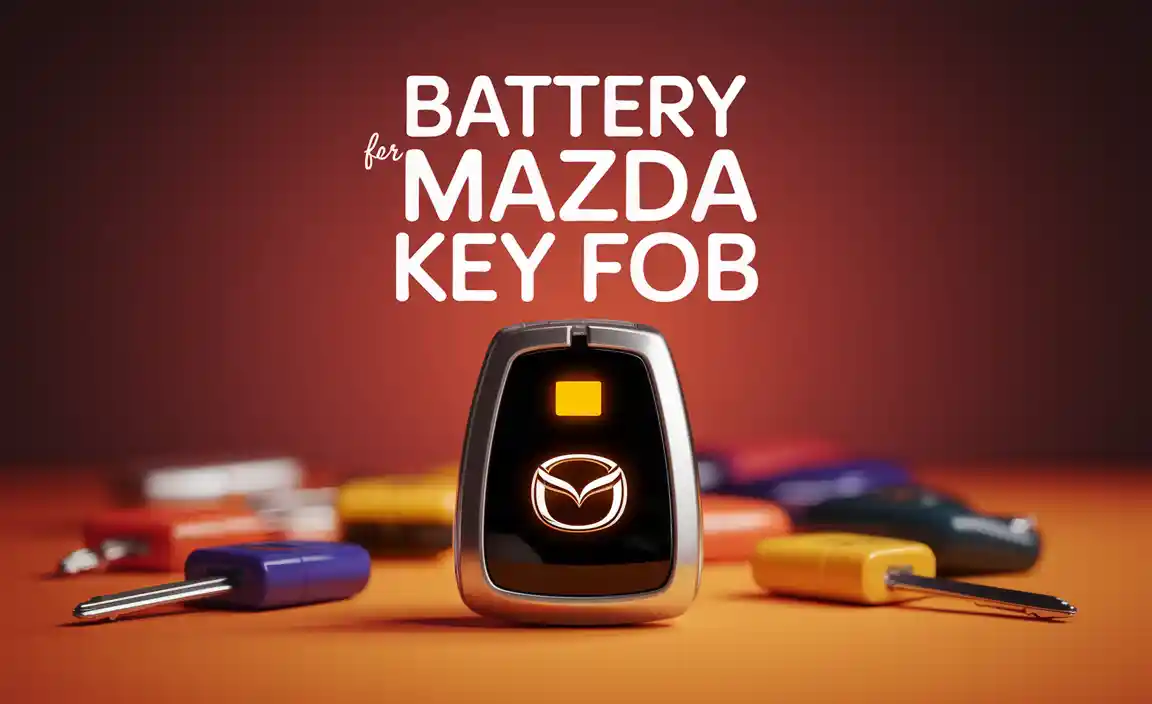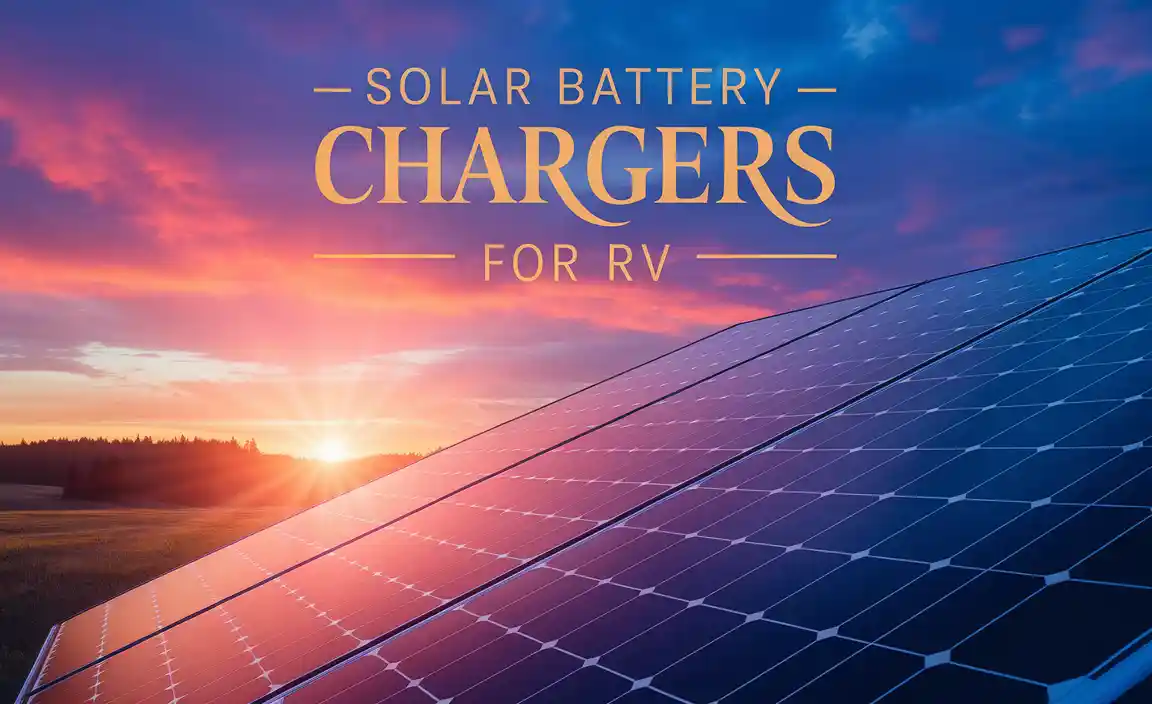Have you ever wondered how batteries work? Or how they power the gadgets we use every day? If you’re looking for a fun science project idea, exploring batteries is a great choice!
When you think about it, batteries are all around us. From toys to flashlights, they make many things work. You might be surprised to learn that you can even create your own battery at home!
Imagine impressing your friends with a homemade battery that lights up a small bulb. Sounds cool, right? This project can teach you a lot about electricity and science.
In this article, we will explore different types of batteries and how they function. Get ready for some exciting experiments and simple explanations. Your next science project could spark interest in the amazing world of batteries!
Choosing The Right Battery For Your Science Project

Battery for Science Project
Do you know how batteries power the devices we use every day? A battery for a science project can be simple yet fascinating. You can explore different types, like alkaline or lithium. Try making a homemade battery with lemons or coins to see chemical reactions in action! This fun experiment helps you understand energy storage and conversion. Who knew learning about batteries could spark your creativity and curiosity? Dive in and discover the magic behind these power sources!Factors to Consider When Choosing a Battery
Voltage requirements for different projects. Capacity and longevity considerations.Choosing a battery can be tricky. First, think about the voltage needed for your project. Different projects need different levels of power. For example, a toy might need less voltage than a robot. Second, consider capacity and longevity. Capacity shows how much energy a battery holds. Longer-lasting batteries are better for big projects. Here are some things to think about:
- What voltage does your project need?
- How long do you want the battery to last?
- Is weight important for your project?
What is the best battery for small projects?
The best battery for small projects is a AA or AAA battery. It provides enough voltage without being too heavy.
How does battery capacity affect performance?
Battery capacity affects how long a device works before it needs a recharge. A higher capacity means longer usage time.
Battery Safety Tips
Proper handling and storage guidelines. Common hazards and how to avoid them.Handling batteries safely is very important. Always wear gloves when touching batteries to protect your skin. Store batteries in a cool, dry place. Avoid mixing old and new batteries. Here are some common hazards and ways to avoid them:
- Do not crush or puncture batteries.
- Keep batteries away from metal objects.
- Never expose batteries to heat or fire.
- Dispose of batteries properly, following local guidelines.
Knowing these safety tips can help keep everyone safe during your science project!
How should batteries be stored safely?
Batteries should be stored in a cool, dry area, away from heat sources and sunlight. This keeps them from leaking or exploding.
DIY Battery Options
Instructions for creating batteries from household items. Examples of successful DIY battery projects.Building a DIY battery can be fun and easy! You can use common household items to create your own power source. Here are some simple instructions:
- Use a lemon, copper penny, and zinc nail for a lemon battery.
- Try a potato with wires and a light bulb for a potato battery.
- Combine two metal strips in vinegar for an acid battery.
These projects are not only interesting but also a great way to learn about electricity! Enjoy being creative as you experiment with these ideas.
What are some easy DIY battery projects?
You can create a lemon battery using a lemon, copper penny, and zinc nail. Or, try a potato battery with a potato and wires. These fun projects help you learn about energy!
Real-Life Applications of Batteries in Science Projects
Case studies of successful projects that utilized batteries. Exploring innovative uses of batteries in experiments.Batteries play a big role in fun science projects. Many students use them to create cool inventions. These projects can show how batteries work in real life. For example, kids built a racing car powered by batteries. It zoomed faster than they planned! Others made simple robots. They learned about energy by watching their robots move.
- One student built a battery-powered mini-boat.
- Another created a light-up sign with colorful LED lights.
These examples show how batteries can inspire creativity and learning in science projects. They make ideas come to life!
What are some examples of innovative battery projects?
Many students used batteries in exciting ways. Batteries helped create tiny robots and moving cars.
Resources and Tools for Battery Testing
Recommended tools for measuring battery performance. Online calculators and apps for battery analysis.Testing a battery can feel like a science wizard’s task, but it’s simple! For measuring how well a battery works, grab a multimeter. It shows voltage and current with just a twist of its knobs. Need help? There are handy online calculators and apps like Battery University that help you analyze performance quickly. You can set up your data and watch the magic happen!
| Tool/App | Purpose |
|---|---|
| Multimeter | Measures voltage and current |
| Battery University | Online calculator for battery analysis |
| Smartphone Apps | Track battery health and performance |
Don’t forget, using these tools can turn your project into a battery testing fiesta. The more you measure, the more you learn! And who doesn’t love a party with numbers?
Where to Buy Batteries for Science Projects
Best online and local retailers for purchasing batteries. Tips for comparing prices and quality.If you’re on a quest to find batteries for your science project, look no further! You can snag them easily from popular stores. Online giants like Amazon, Walmart, and eBay offer various options. For a hands-on shopping experience, check out local stores like Home Depot or your neighborhood electronics shop. Comparing prices can help you save some cash. Remember, the most expensive battery isn’t always the best! Sometimes, a “budget” battery can power your project just as well. Plus, make sure to read reviews, as those can be a treasure trove of information.
| Store Type | Recommended Retailers |
|---|---|
| Online | Amazon, Walmart, eBay |
| Local | Home Depot, Electronics stores |
Frequently Asked Questions About Batteries in Science Projects
Common queries students have regarding battery use. Expert advice and solutions for typical challenges.Many students wonder about the best batteries for their projects. They ask things like, “Can I use AA batteries?” or “How do I make my battery last longer?” Battery choices really matter! Choose alkaline batteries for most projects since they pack a punch. If your project is powering tiny toys, you might need smaller batteries. Also, remember that good old-fashioned vinegar can make a battery! It’s like magic. Now, let’s tackle some quick FAQs!
| Question | Answer |
|---|---|
| Can I use rechargeable batteries? | Yes! They are great for saving the environment. |
| What if my project isn’t working? | Check if the batteries are installed correctly. They can be sneaky! |
| How do I keep my batteries safe? | Use tape to secure them. Batteries love to play hide-and-seek! |
Conclusion
In conclusion, a battery for your science project can be both fun and educational. You can explore different types, like lemon or solar batteries. Experimenting helps you understand how batteries work. Remember to keep your projects safe and ask for help when needed. So, gather your materials, get creative, and start your exciting battery experiments today!FAQs
Sure! Here Are Five Related Questions About Batteries For A Science Project:Sure! Here are five questions we can explore about batteries for your science project: 1. What is a battery made of? 2. How do batteries store energy? 3. Why do batteries lose power over time? 4. Can we recycle batteries? 5. What are different types of batteries we can use? We can learn a lot by answering these questions!
Sure! Please provide me with the question you’d like answered, and I’ll help you with it.
What Are The Fundamental Principles Of How Batteries Store And Release Electrical Energy?Batteries store energy in chemical form. When you use a battery, it changes the chemicals inside into electricity. This electricity can power toys, lights, or other devices. When the battery runs out, we recharge it, turning the chemicals back into energy. It’s like a little power pack that gets filled up again!
How Do Different Types Of Batteries (E.G., Alkaline, Lithium-Ion, Nickel-Metal Hydride) Compare In Terms Of Efficiency, Capacity, And Environmental Impact?Different types of batteries work in different ways. Alkaline batteries are good for toys and flashlights. They don’t last long and can’t be recharged. Lithium-ion batteries, used in phones and laptops, last longer and can be charged many times. Nickel-metal hydride batteries are also rechargeable and are good for cameras. However, they can harm the environment if not disposed of properly. Always recycle batteries to help the planet!
What Materials Are Commonly Used In The Construction Of Batteries, And How Do They Affect Battery Performance?Batteries are made from materials like lithium, nickel, and cobalt. These materials help store and release energy. For example, lithium is light and stores a lot of power, making batteries last longer. The right materials make the battery work better and help keep your devices running smoothly.
How Can We Demonstrate The Electrochemical Reactions That Occur In A Simple Homemade Battery?To show how a homemade battery works, we can use two different metals like copper and zinc. First, we put a piece of copper and a piece of zinc in a glass of vinegar or saltwater. When they touch the liquid, a chemical reaction happens. This reaction creates electricity, which can light up a small bulb or power a tiny clock!
What Are The Current Advancements In Battery Technology, And How Might They Influence Future Energy Storage Solutions?Right now, scientists are making batteries better and smaller. They are working on solid-state batteries, which are safer and hold more energy. We can also use new materials like lithium-sulfur to help batteries last longer. These advancements can help our phones and electric cars run better. In the future, we might have batteries that charge super fast and last for days!
{“@context”:”https://schema.org”,”@type”: “FAQPage”,”mainEntity”:[{“@type”: “Question”,”name”: “Sure! Here Are Five Related Questions About Batteries For A Science Project:”,”acceptedAnswer”: {“@type”: “Answer”,”text”: “Sure! Here are five questions we can explore about batteries for your science project: 1. What is a battery made of? 2. How do batteries store energy? 3. Why do batteries lose power over time? 4. Can we recycle batteries? 5. What are different types of batteries we can use? We can learn a lot by answering these questions!”}},{“@type”: “Question”,”name”: “”,”acceptedAnswer”: {“@type”: “Answer”,”text”: “Sure! Please provide me with the question you’d like answered, and I’ll help you with it.”}},{“@type”: “Question”,”name”: “What Are The Fundamental Principles Of How Batteries Store And Release Electrical Energy?”,”acceptedAnswer”: {“@type”: “Answer”,”text”: “Batteries store energy in chemical form. When you use a battery, it changes the chemicals inside into electricity. This electricity can power toys, lights, or other devices. When the battery runs out, we recharge it, turning the chemicals back into energy. It’s like a little power pack that gets filled up again!”}},{“@type”: “Question”,”name”: “How Do Different Types Of Batteries (E.G., Alkaline, Lithium-Ion, Nickel-Metal Hydride) Compare In Terms Of Efficiency, Capacity, And Environmental Impact?”,”acceptedAnswer”: {“@type”: “Answer”,”text”: “Different types of batteries work in different ways. Alkaline batteries are good for toys and flashlights. They don’t last long and can’t be recharged. Lithium-ion batteries, used in phones and laptops, last longer and can be charged many times. Nickel-metal hydride batteries are also rechargeable and are good for cameras. However, they can harm the environment if not disposed of properly. Always recycle batteries to help the planet!”}},{“@type”: “Question”,”name”: “What Materials Are Commonly Used In The Construction Of Batteries, And How Do They Affect Battery Performance?”,”acceptedAnswer”: {“@type”: “Answer”,”text”: “Batteries are made from materials like lithium, nickel, and cobalt. These materials help store and release energy. For example, lithium is light and stores a lot of power, making batteries last longer. The right materials make the battery work better and help keep your devices running smoothly.”}},{“@type”: “Question”,”name”: “How Can We Demonstrate The Electrochemical Reactions That Occur In A Simple Homemade Battery?”,”acceptedAnswer”: {“@type”: “Answer”,”text”: “To show how a homemade battery works, we can use two different metals like copper and zinc. First, we put a piece of copper and a piece of zinc in a glass of vinegar or saltwater. When they touch the liquid, a chemical reaction happens. This reaction creates electricity, which can light up a small bulb or power a tiny clock!”}},{“@type”: “Question”,”name”: “What Are The Current Advancements In Battery Technology, And How Might They Influence Future Energy Storage Solutions?”,”acceptedAnswer”: {“@type”: “Answer”,”text”: “Right now, scientists are making batteries better and smaller. They are working on solid-state batteries, which are safer and hold more energy. We can also use new materials like lithium-sulfur to help batteries last longer. These advancements can help our phones and electric cars run better. In the future, we might have batteries that charge super fast and last for days!”}}]}





